Small Business Success Factors
VerifiedAdded on 2020/06/05
|15
|4756
|416
AI Summary
This assignment explores the critical factors contributing to the success of small businesses. It examines various perspectives on entrepreneurial traits, the impact of public policy levers, and the role of social innovation in driving sustainable business growth within a developing economy context. The assignment requires students to critically analyze academic literature and research findings to identify key success criteria for small businesses.
Contribute Materials
Your contribution can guide someone’s learning journey. Share your
documents today.

Entrepreneurship and Small Business
Management
Management
Secure Best Marks with AI Grader
Need help grading? Try our AI Grader for instant feedback on your assignments.
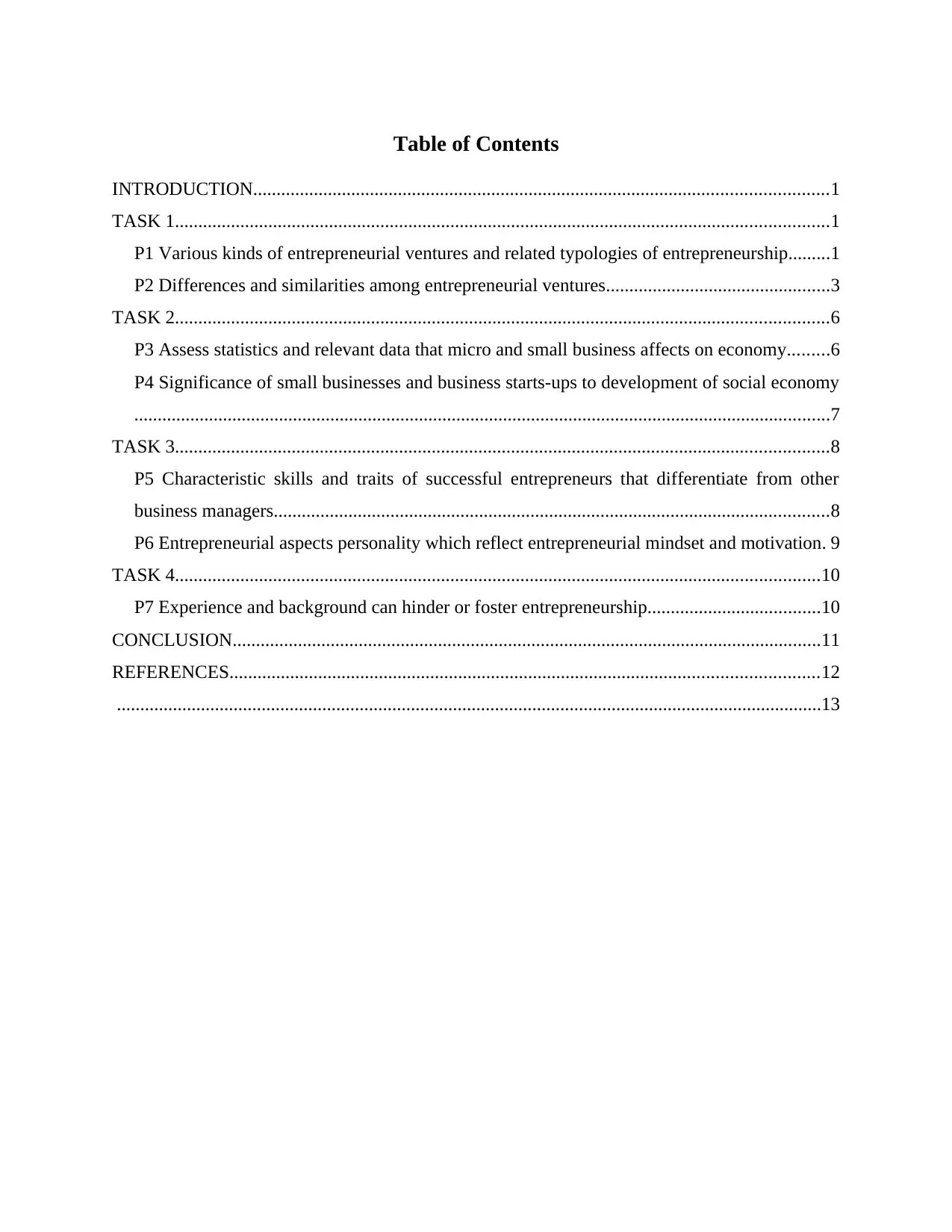
Table of Contents
INTRODUCTION...........................................................................................................................1
TASK 1............................................................................................................................................1
P1 Various kinds of entrepreneurial ventures and related typologies of entrepreneurship.........1
P2 Differences and similarities among entrepreneurial ventures................................................3
TASK 2............................................................................................................................................6
P3 Assess statistics and relevant data that micro and small business affects on economy.........6
P4 Significance of small businesses and business starts-ups to development of social economy
.....................................................................................................................................................7
TASK 3............................................................................................................................................8
P5 Characteristic skills and traits of successful entrepreneurs that differentiate from other
business managers.......................................................................................................................8
P6 Entrepreneurial aspects personality which reflect entrepreneurial mindset and motivation. 9
TASK 4..........................................................................................................................................10
P7 Experience and background can hinder or foster entrepreneurship.....................................10
CONCLUSION..............................................................................................................................11
REFERENCES..............................................................................................................................12
.......................................................................................................................................................13
INTRODUCTION...........................................................................................................................1
TASK 1............................................................................................................................................1
P1 Various kinds of entrepreneurial ventures and related typologies of entrepreneurship.........1
P2 Differences and similarities among entrepreneurial ventures................................................3
TASK 2............................................................................................................................................6
P3 Assess statistics and relevant data that micro and small business affects on economy.........6
P4 Significance of small businesses and business starts-ups to development of social economy
.....................................................................................................................................................7
TASK 3............................................................................................................................................8
P5 Characteristic skills and traits of successful entrepreneurs that differentiate from other
business managers.......................................................................................................................8
P6 Entrepreneurial aspects personality which reflect entrepreneurial mindset and motivation. 9
TASK 4..........................................................................................................................................10
P7 Experience and background can hinder or foster entrepreneurship.....................................10
CONCLUSION..............................................................................................................................11
REFERENCES..............................................................................................................................12
.......................................................................................................................................................13
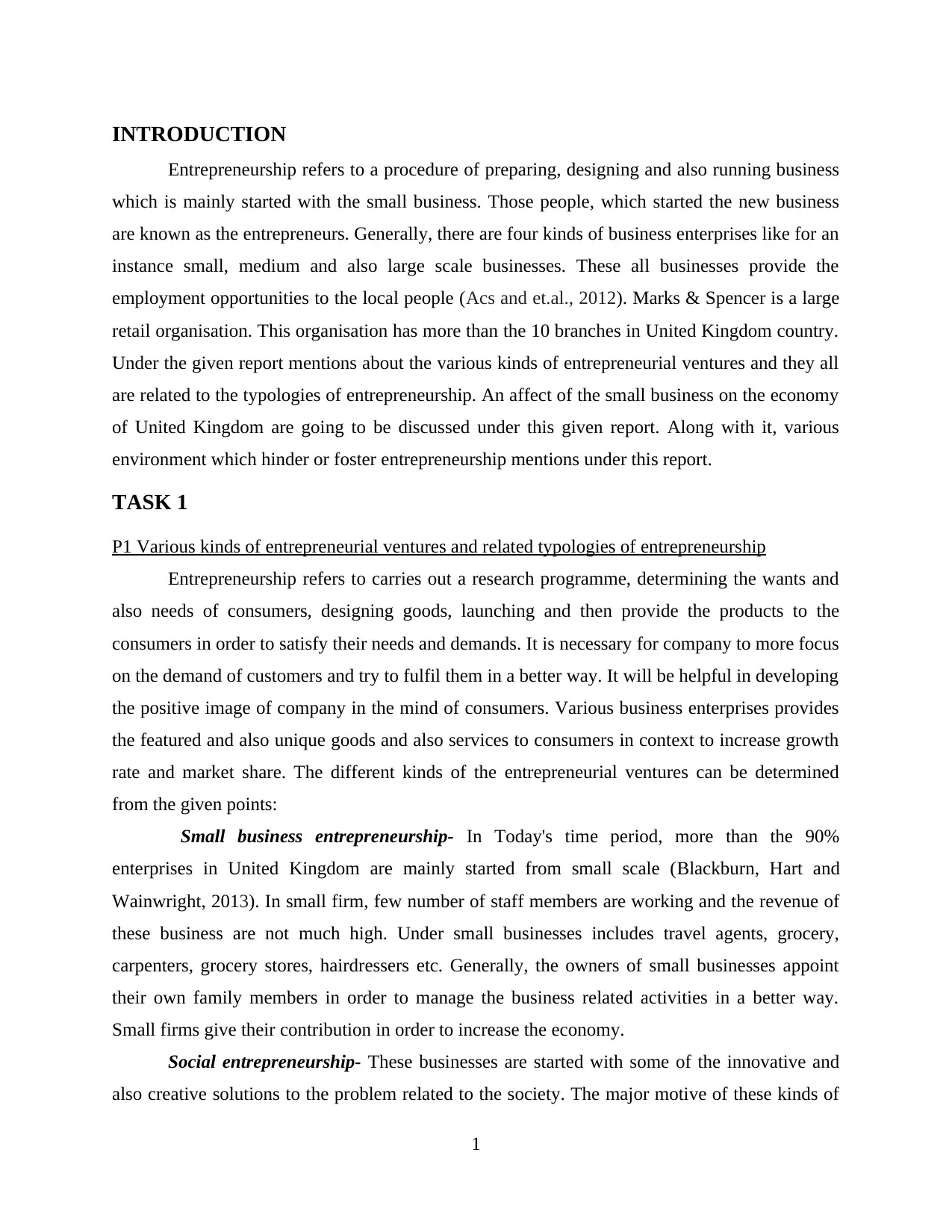
INTRODUCTION
Entrepreneurship refers to a procedure of preparing, designing and also running business
which is mainly started with the small business. Those people, which started the new business
are known as the entrepreneurs. Generally, there are four kinds of business enterprises like for an
instance small, medium and also large scale businesses. These all businesses provide the
employment opportunities to the local people (Acs and et.al., 2012). Marks & Spencer is a large
retail organisation. This organisation has more than the 10 branches in United Kingdom country.
Under the given report mentions about the various kinds of entrepreneurial ventures and they all
are related to the typologies of entrepreneurship. An affect of the small business on the economy
of United Kingdom are going to be discussed under this given report. Along with it, various
environment which hinder or foster entrepreneurship mentions under this report.
TASK 1
P1 Various kinds of entrepreneurial ventures and related typologies of entrepreneurship
Entrepreneurship refers to carries out a research programme, determining the wants and
also needs of consumers, designing goods, launching and then provide the products to the
consumers in order to satisfy their needs and demands. It is necessary for company to more focus
on the demand of customers and try to fulfil them in a better way. It will be helpful in developing
the positive image of company in the mind of consumers. Various business enterprises provides
the featured and also unique goods and also services to consumers in context to increase growth
rate and market share. The different kinds of the entrepreneurial ventures can be determined
from the given points:
Small business entrepreneurship- In Today's time period, more than the 90%
enterprises in United Kingdom are mainly started from small scale (Blackburn, Hart and
Wainwright, 2013). In small firm, few number of staff members are working and the revenue of
these business are not much high. Under small businesses includes travel agents, grocery,
carpenters, grocery stores, hairdressers etc. Generally, the owners of small businesses appoint
their own family members in order to manage the business related activities in a better way.
Small firms give their contribution in order to increase the economy.
Social entrepreneurship- These businesses are started with some of the innovative and
also creative solutions to the problem related to the society. The major motive of these kinds of
1
Entrepreneurship refers to a procedure of preparing, designing and also running business
which is mainly started with the small business. Those people, which started the new business
are known as the entrepreneurs. Generally, there are four kinds of business enterprises like for an
instance small, medium and also large scale businesses. These all businesses provide the
employment opportunities to the local people (Acs and et.al., 2012). Marks & Spencer is a large
retail organisation. This organisation has more than the 10 branches in United Kingdom country.
Under the given report mentions about the various kinds of entrepreneurial ventures and they all
are related to the typologies of entrepreneurship. An affect of the small business on the economy
of United Kingdom are going to be discussed under this given report. Along with it, various
environment which hinder or foster entrepreneurship mentions under this report.
TASK 1
P1 Various kinds of entrepreneurial ventures and related typologies of entrepreneurship
Entrepreneurship refers to carries out a research programme, determining the wants and
also needs of consumers, designing goods, launching and then provide the products to the
consumers in order to satisfy their needs and demands. It is necessary for company to more focus
on the demand of customers and try to fulfil them in a better way. It will be helpful in developing
the positive image of company in the mind of consumers. Various business enterprises provides
the featured and also unique goods and also services to consumers in context to increase growth
rate and market share. The different kinds of the entrepreneurial ventures can be determined
from the given points:
Small business entrepreneurship- In Today's time period, more than the 90%
enterprises in United Kingdom are mainly started from small scale (Blackburn, Hart and
Wainwright, 2013). In small firm, few number of staff members are working and the revenue of
these business are not much high. Under small businesses includes travel agents, grocery,
carpenters, grocery stores, hairdressers etc. Generally, the owners of small businesses appoint
their own family members in order to manage the business related activities in a better way.
Small firms give their contribution in order to increase the economy.
Social entrepreneurship- These businesses are started with some of the innovative and
also creative solutions to the problem related to the society. The major motive of these kinds of
1
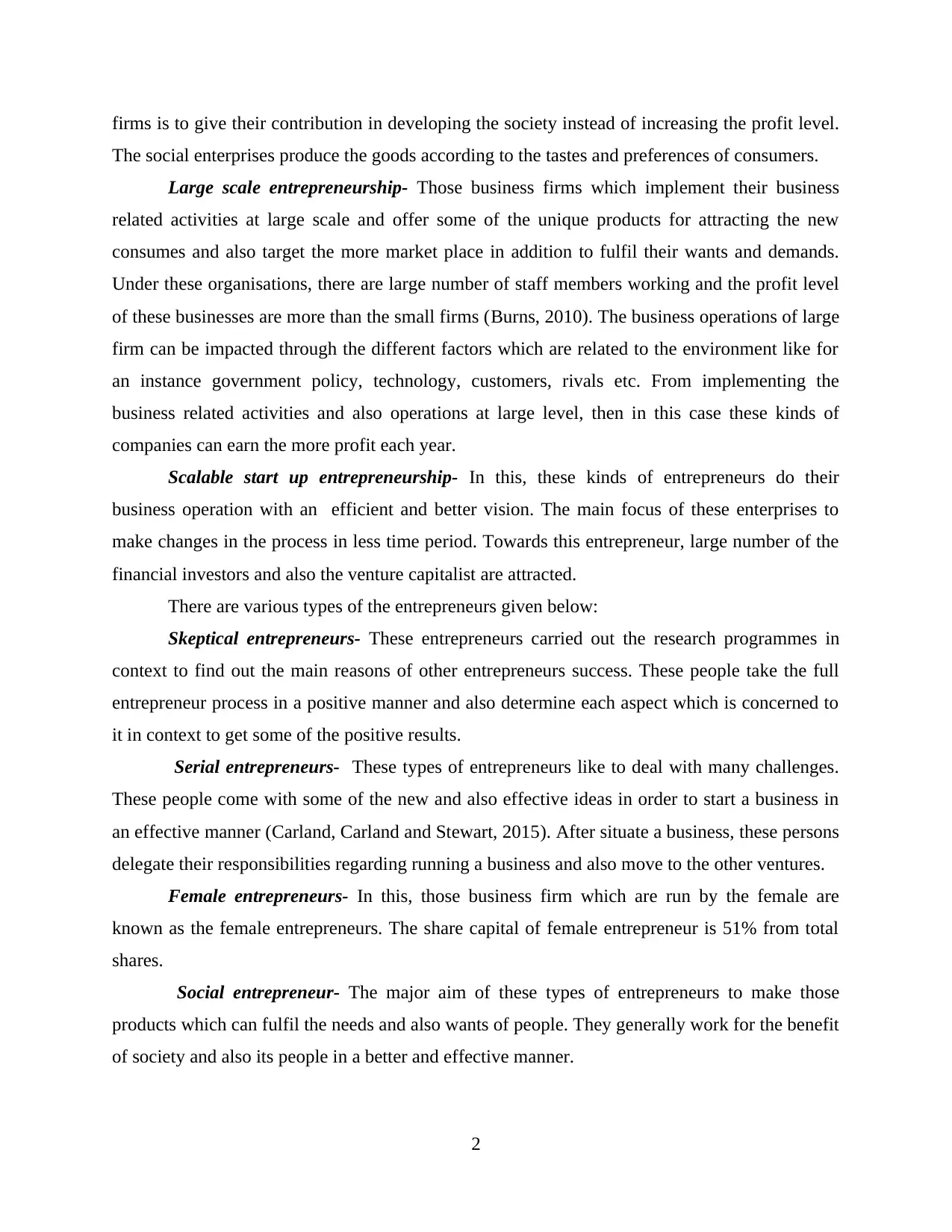
firms is to give their contribution in developing the society instead of increasing the profit level.
The social enterprises produce the goods according to the tastes and preferences of consumers.
Large scale entrepreneurship- Those business firms which implement their business
related activities at large scale and offer some of the unique products for attracting the new
consumes and also target the more market place in addition to fulfil their wants and demands.
Under these organisations, there are large number of staff members working and the profit level
of these businesses are more than the small firms (Burns, 2010). The business operations of large
firm can be impacted through the different factors which are related to the environment like for
an instance government policy, technology, customers, rivals etc. From implementing the
business related activities and also operations at large level, then in this case these kinds of
companies can earn the more profit each year.
Scalable start up entrepreneurship- In this, these kinds of entrepreneurs do their
business operation with an efficient and better vision. The main focus of these enterprises to
make changes in the process in less time period. Towards this entrepreneur, large number of the
financial investors and also the venture capitalist are attracted.
There are various types of the entrepreneurs given below:
Skeptical entrepreneurs- These entrepreneurs carried out the research programmes in
context to find out the main reasons of other entrepreneurs success. These people take the full
entrepreneur process in a positive manner and also determine each aspect which is concerned to
it in context to get some of the positive results.
Serial entrepreneurs- These types of entrepreneurs like to deal with many challenges.
These people come with some of the new and also effective ideas in order to start a business in
an effective manner (Carland, Carland and Stewart, 2015). After situate a business, these persons
delegate their responsibilities regarding running a business and also move to the other ventures.
Female entrepreneurs- In this, those business firm which are run by the female are
known as the female entrepreneurs. The share capital of female entrepreneur is 51% from total
shares.
Social entrepreneur- The major aim of these types of entrepreneurs to make those
products which can fulfil the needs and also wants of people. They generally work for the benefit
of society and also its people in a better and effective manner.
2
The social enterprises produce the goods according to the tastes and preferences of consumers.
Large scale entrepreneurship- Those business firms which implement their business
related activities at large scale and offer some of the unique products for attracting the new
consumes and also target the more market place in addition to fulfil their wants and demands.
Under these organisations, there are large number of staff members working and the profit level
of these businesses are more than the small firms (Burns, 2010). The business operations of large
firm can be impacted through the different factors which are related to the environment like for
an instance government policy, technology, customers, rivals etc. From implementing the
business related activities and also operations at large level, then in this case these kinds of
companies can earn the more profit each year.
Scalable start up entrepreneurship- In this, these kinds of entrepreneurs do their
business operation with an efficient and better vision. The main focus of these enterprises to
make changes in the process in less time period. Towards this entrepreneur, large number of the
financial investors and also the venture capitalist are attracted.
There are various types of the entrepreneurs given below:
Skeptical entrepreneurs- These entrepreneurs carried out the research programmes in
context to find out the main reasons of other entrepreneurs success. These people take the full
entrepreneur process in a positive manner and also determine each aspect which is concerned to
it in context to get some of the positive results.
Serial entrepreneurs- These types of entrepreneurs like to deal with many challenges.
These people come with some of the new and also effective ideas in order to start a business in
an effective manner (Carland, Carland and Stewart, 2015). After situate a business, these persons
delegate their responsibilities regarding running a business and also move to the other ventures.
Female entrepreneurs- In this, those business firm which are run by the female are
known as the female entrepreneurs. The share capital of female entrepreneur is 51% from total
shares.
Social entrepreneur- The major aim of these types of entrepreneurs to make those
products which can fulfil the needs and also wants of people. They generally work for the benefit
of society and also its people in a better and effective manner.
2
Secure Best Marks with AI Grader
Need help grading? Try our AI Grader for instant feedback on your assignments.
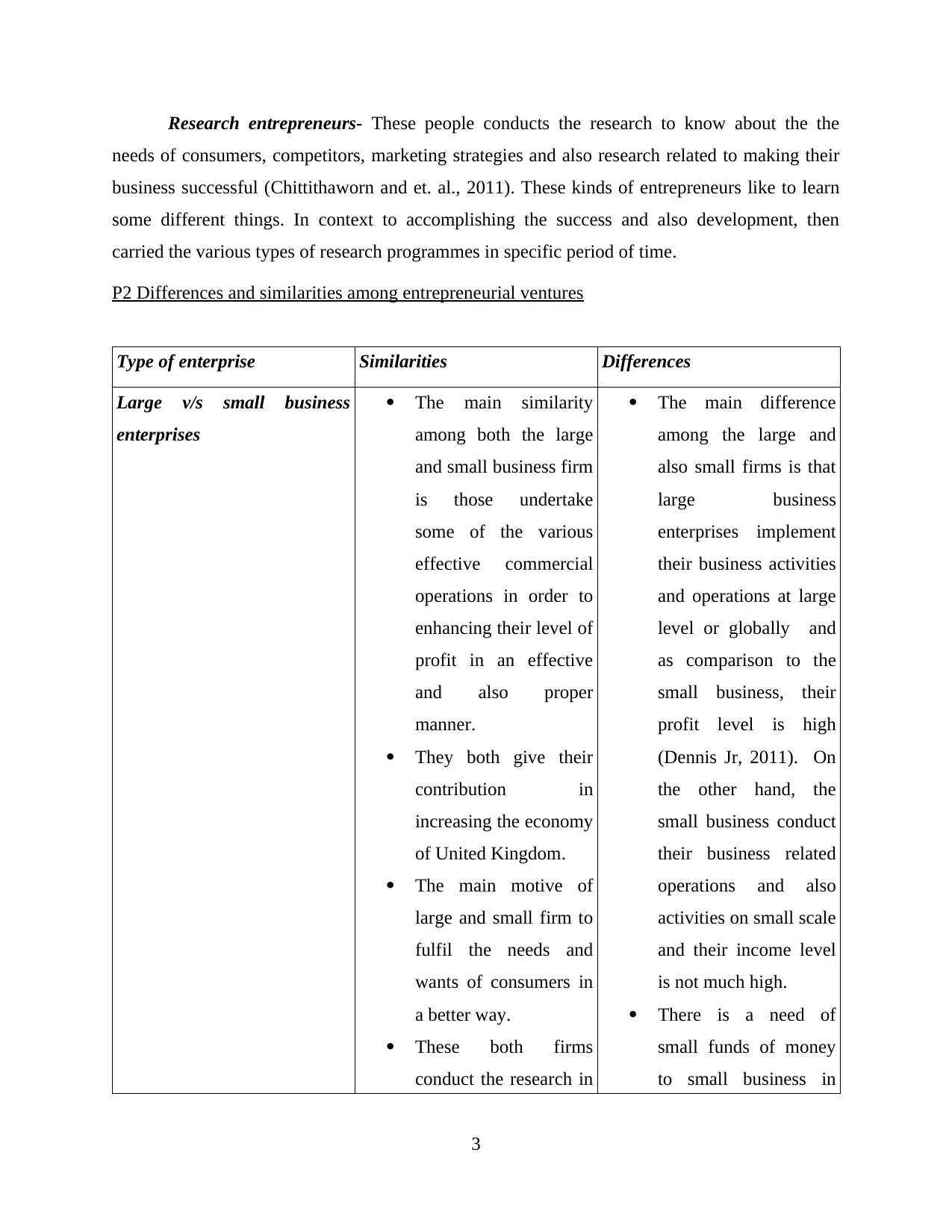
Research entrepreneurs- These people conducts the research to know about the the
needs of consumers, competitors, marketing strategies and also research related to making their
business successful (Chittithaworn and et. al., 2011). These kinds of entrepreneurs like to learn
some different things. In context to accomplishing the success and also development, then
carried the various types of research programmes in specific period of time.
P2 Differences and similarities among entrepreneurial ventures
Type of enterprise Similarities Differences
Large v/s small business
enterprises
The main similarity
among both the large
and small business firm
is those undertake
some of the various
effective commercial
operations in order to
enhancing their level of
profit in an effective
and also proper
manner.
They both give their
contribution in
increasing the economy
of United Kingdom.
The main motive of
large and small firm to
fulfil the needs and
wants of consumers in
a better way.
These both firms
conduct the research in
The main difference
among the large and
also small firms is that
large business
enterprises implement
their business activities
and operations at large
level or globally and
as comparison to the
small business, their
profit level is high
(Dennis Jr, 2011). On
the other hand, the
small business conduct
their business related
operations and also
activities on small scale
and their income level
is not much high.
There is a need of
small funds of money
to small business in
3
needs of consumers, competitors, marketing strategies and also research related to making their
business successful (Chittithaworn and et. al., 2011). These kinds of entrepreneurs like to learn
some different things. In context to accomplishing the success and also development, then
carried the various types of research programmes in specific period of time.
P2 Differences and similarities among entrepreneurial ventures
Type of enterprise Similarities Differences
Large v/s small business
enterprises
The main similarity
among both the large
and small business firm
is those undertake
some of the various
effective commercial
operations in order to
enhancing their level of
profit in an effective
and also proper
manner.
They both give their
contribution in
increasing the economy
of United Kingdom.
The main motive of
large and small firm to
fulfil the needs and
wants of consumers in
a better way.
These both firms
conduct the research in
The main difference
among the large and
also small firms is that
large business
enterprises implement
their business activities
and operations at large
level or globally and
as comparison to the
small business, their
profit level is high
(Dennis Jr, 2011). On
the other hand, the
small business conduct
their business related
operations and also
activities on small scale
and their income level
is not much high.
There is a need of
small funds of money
to small business in
3
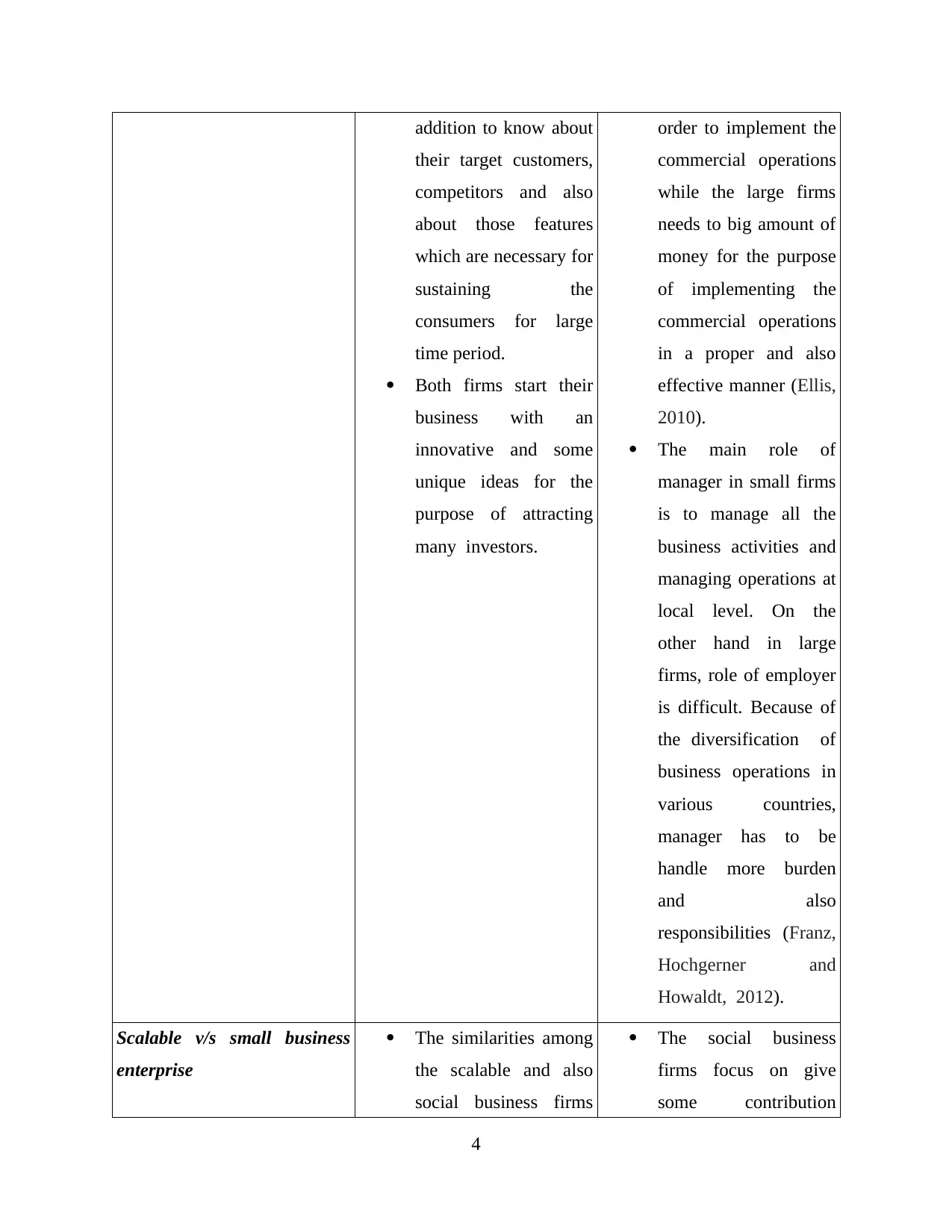
addition to know about
their target customers,
competitors and also
about those features
which are necessary for
sustaining the
consumers for large
time period.
Both firms start their
business with an
innovative and some
unique ideas for the
purpose of attracting
many investors.
order to implement the
commercial operations
while the large firms
needs to big amount of
money for the purpose
of implementing the
commercial operations
in a proper and also
effective manner (Ellis,
2010).
The main role of
manager in small firms
is to manage all the
business activities and
managing operations at
local level. On the
other hand in large
firms, role of employer
is difficult. Because of
the diversification of
business operations in
various countries,
manager has to be
handle more burden
and also
responsibilities (Franz,
Hochgerner and
Howaldt, 2012).
Scalable v/s small business
enterprise
The similarities among
the scalable and also
social business firms
The social business
firms focus on give
some contribution
4
their target customers,
competitors and also
about those features
which are necessary for
sustaining the
consumers for large
time period.
Both firms start their
business with an
innovative and some
unique ideas for the
purpose of attracting
many investors.
order to implement the
commercial operations
while the large firms
needs to big amount of
money for the purpose
of implementing the
commercial operations
in a proper and also
effective manner (Ellis,
2010).
The main role of
manager in small firms
is to manage all the
business activities and
managing operations at
local level. On the
other hand in large
firms, role of employer
is difficult. Because of
the diversification of
business operations in
various countries,
manager has to be
handle more burden
and also
responsibilities (Franz,
Hochgerner and
Howaldt, 2012).
Scalable v/s small business
enterprise
The similarities among
the scalable and also
social business firms
The social business
firms focus on give
some contribution
4
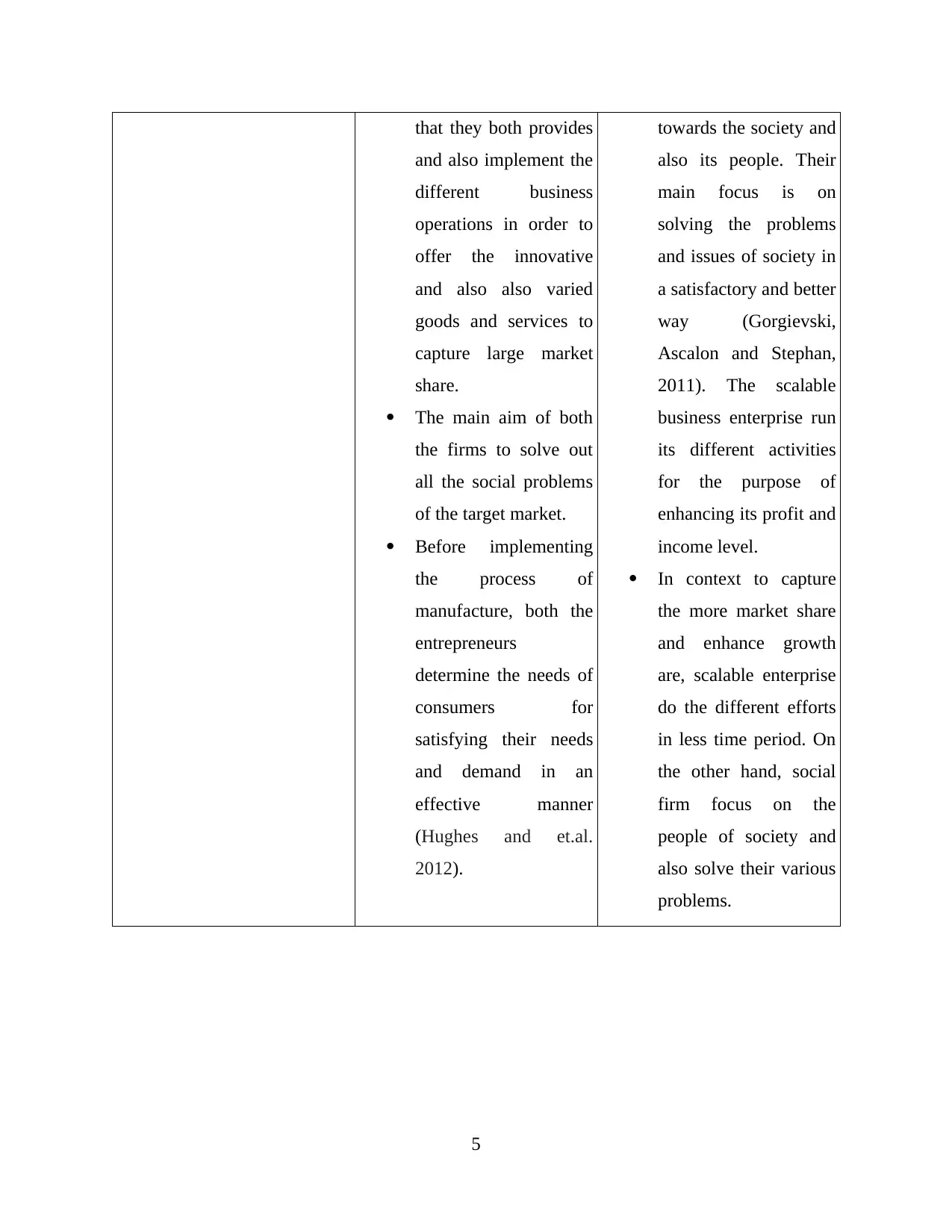
that they both provides
and also implement the
different business
operations in order to
offer the innovative
and also also varied
goods and services to
capture large market
share.
The main aim of both
the firms to solve out
all the social problems
of the target market.
Before implementing
the process of
manufacture, both the
entrepreneurs
determine the needs of
consumers for
satisfying their needs
and demand in an
effective manner
(Hughes and et.al.
2012).
towards the society and
also its people. Their
main focus is on
solving the problems
and issues of society in
a satisfactory and better
way (Gorgievski,
Ascalon and Stephan,
2011). The scalable
business enterprise run
its different activities
for the purpose of
enhancing its profit and
income level.
In context to capture
the more market share
and enhance growth
are, scalable enterprise
do the different efforts
in less time period. On
the other hand, social
firm focus on the
people of society and
also solve their various
problems.
5
and also implement the
different business
operations in order to
offer the innovative
and also also varied
goods and services to
capture large market
share.
The main aim of both
the firms to solve out
all the social problems
of the target market.
Before implementing
the process of
manufacture, both the
entrepreneurs
determine the needs of
consumers for
satisfying their needs
and demand in an
effective manner
(Hughes and et.al.
2012).
towards the society and
also its people. Their
main focus is on
solving the problems
and issues of society in
a satisfactory and better
way (Gorgievski,
Ascalon and Stephan,
2011). The scalable
business enterprise run
its different activities
for the purpose of
enhancing its profit and
income level.
In context to capture
the more market share
and enhance growth
are, scalable enterprise
do the different efforts
in less time period. On
the other hand, social
firm focus on the
people of society and
also solve their various
problems.
5
Paraphrase This Document
Need a fresh take? Get an instant paraphrase of this document with our AI Paraphraser
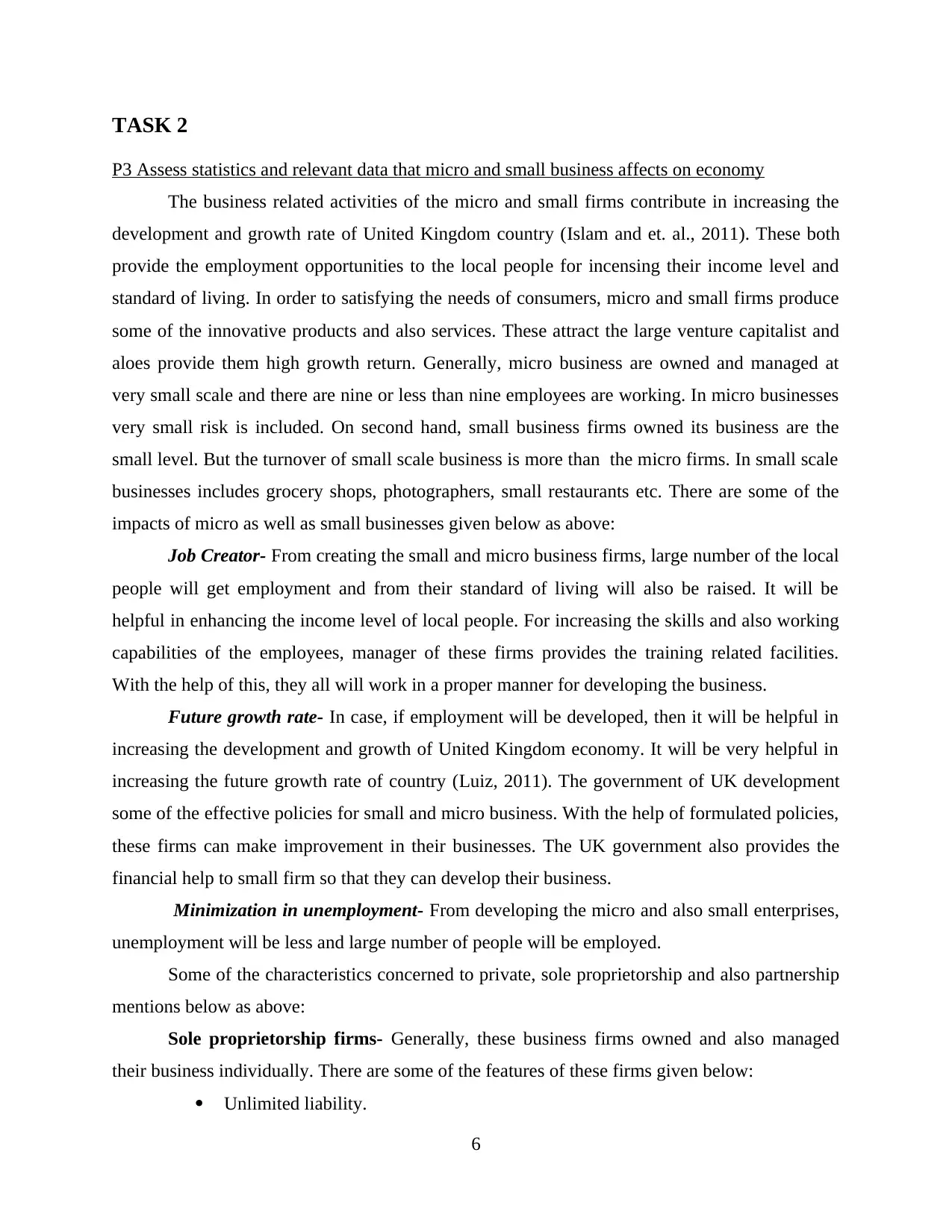
TASK 2
P3 Assess statistics and relevant data that micro and small business affects on economy
The business related activities of the micro and small firms contribute in increasing the
development and growth rate of United Kingdom country (Islam and et. al., 2011). These both
provide the employment opportunities to the local people for incensing their income level and
standard of living. In order to satisfying the needs of consumers, micro and small firms produce
some of the innovative products and also services. These attract the large venture capitalist and
aloes provide them high growth return. Generally, micro business are owned and managed at
very small scale and there are nine or less than nine employees are working. In micro businesses
very small risk is included. On second hand, small business firms owned its business are the
small level. But the turnover of small scale business is more than the micro firms. In small scale
businesses includes grocery shops, photographers, small restaurants etc. There are some of the
impacts of micro as well as small businesses given below as above:
Job Creator- From creating the small and micro business firms, large number of the local
people will get employment and from their standard of living will also be raised. It will be
helpful in enhancing the income level of local people. For increasing the skills and also working
capabilities of the employees, manager of these firms provides the training related facilities.
With the help of this, they all will work in a proper manner for developing the business.
Future growth rate- In case, if employment will be developed, then it will be helpful in
increasing the development and growth of United Kingdom economy. It will be very helpful in
increasing the future growth rate of country (Luiz, 2011). The government of UK development
some of the effective policies for small and micro business. With the help of formulated policies,
these firms can make improvement in their businesses. The UK government also provides the
financial help to small firm so that they can develop their business.
Minimization in unemployment- From developing the micro and also small enterprises,
unemployment will be less and large number of people will be employed.
Some of the characteristics concerned to private, sole proprietorship and also partnership
mentions below as above:
Sole proprietorship firms- Generally, these business firms owned and also managed
their business individually. There are some of the features of these firms given below:
Unlimited liability.
6
P3 Assess statistics and relevant data that micro and small business affects on economy
The business related activities of the micro and small firms contribute in increasing the
development and growth rate of United Kingdom country (Islam and et. al., 2011). These both
provide the employment opportunities to the local people for incensing their income level and
standard of living. In order to satisfying the needs of consumers, micro and small firms produce
some of the innovative products and also services. These attract the large venture capitalist and
aloes provide them high growth return. Generally, micro business are owned and managed at
very small scale and there are nine or less than nine employees are working. In micro businesses
very small risk is included. On second hand, small business firms owned its business are the
small level. But the turnover of small scale business is more than the micro firms. In small scale
businesses includes grocery shops, photographers, small restaurants etc. There are some of the
impacts of micro as well as small businesses given below as above:
Job Creator- From creating the small and micro business firms, large number of the local
people will get employment and from their standard of living will also be raised. It will be
helpful in enhancing the income level of local people. For increasing the skills and also working
capabilities of the employees, manager of these firms provides the training related facilities.
With the help of this, they all will work in a proper manner for developing the business.
Future growth rate- In case, if employment will be developed, then it will be helpful in
increasing the development and growth of United Kingdom economy. It will be very helpful in
increasing the future growth rate of country (Luiz, 2011). The government of UK development
some of the effective policies for small and micro business. With the help of formulated policies,
these firms can make improvement in their businesses. The UK government also provides the
financial help to small firm so that they can develop their business.
Minimization in unemployment- From developing the micro and also small enterprises,
unemployment will be less and large number of people will be employed.
Some of the characteristics concerned to private, sole proprietorship and also partnership
mentions below as above:
Sole proprietorship firms- Generally, these business firms owned and also managed
their business individually. There are some of the features of these firms given below:
Unlimited liability.
6
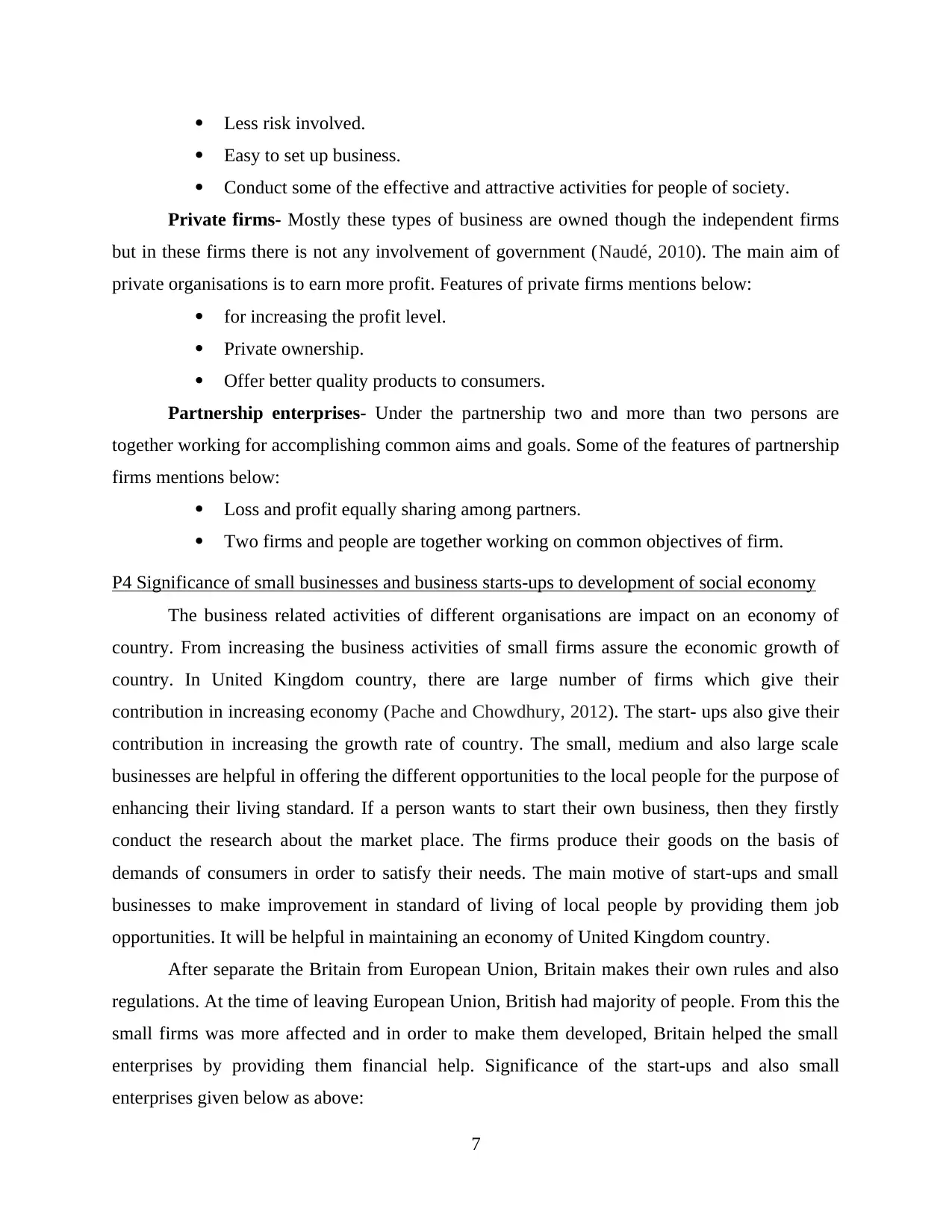
Less risk involved.
Easy to set up business.
Conduct some of the effective and attractive activities for people of society.
Private firms- Mostly these types of business are owned though the independent firms
but in these firms there is not any involvement of government (Naudé, 2010). The main aim of
private organisations is to earn more profit. Features of private firms mentions below:
for increasing the profit level.
Private ownership.
Offer better quality products to consumers.
Partnership enterprises- Under the partnership two and more than two persons are
together working for accomplishing common aims and goals. Some of the features of partnership
firms mentions below:
Loss and profit equally sharing among partners.
Two firms and people are together working on common objectives of firm.
P4 Significance of small businesses and business starts-ups to development of social economy
The business related activities of different organisations are impact on an economy of
country. From increasing the business activities of small firms assure the economic growth of
country. In United Kingdom country, there are large number of firms which give their
contribution in increasing economy (Pache and Chowdhury, 2012). The start- ups also give their
contribution in increasing the growth rate of country. The small, medium and also large scale
businesses are helpful in offering the different opportunities to the local people for the purpose of
enhancing their living standard. If a person wants to start their own business, then they firstly
conduct the research about the market place. The firms produce their goods on the basis of
demands of consumers in order to satisfy their needs. The main motive of start-ups and small
businesses to make improvement in standard of living of local people by providing them job
opportunities. It will be helpful in maintaining an economy of United Kingdom country.
After separate the Britain from European Union, Britain makes their own rules and also
regulations. At the time of leaving European Union, British had majority of people. From this the
small firms was more affected and in order to make them developed, Britain helped the small
enterprises by providing them financial help. Significance of the start-ups and also small
enterprises given below as above:
7
Easy to set up business.
Conduct some of the effective and attractive activities for people of society.
Private firms- Mostly these types of business are owned though the independent firms
but in these firms there is not any involvement of government (Naudé, 2010). The main aim of
private organisations is to earn more profit. Features of private firms mentions below:
for increasing the profit level.
Private ownership.
Offer better quality products to consumers.
Partnership enterprises- Under the partnership two and more than two persons are
together working for accomplishing common aims and goals. Some of the features of partnership
firms mentions below:
Loss and profit equally sharing among partners.
Two firms and people are together working on common objectives of firm.
P4 Significance of small businesses and business starts-ups to development of social economy
The business related activities of different organisations are impact on an economy of
country. From increasing the business activities of small firms assure the economic growth of
country. In United Kingdom country, there are large number of firms which give their
contribution in increasing economy (Pache and Chowdhury, 2012). The start- ups also give their
contribution in increasing the growth rate of country. The small, medium and also large scale
businesses are helpful in offering the different opportunities to the local people for the purpose of
enhancing their living standard. If a person wants to start their own business, then they firstly
conduct the research about the market place. The firms produce their goods on the basis of
demands of consumers in order to satisfy their needs. The main motive of start-ups and small
businesses to make improvement in standard of living of local people by providing them job
opportunities. It will be helpful in maintaining an economy of United Kingdom country.
After separate the Britain from European Union, Britain makes their own rules and also
regulations. At the time of leaving European Union, British had majority of people. From this the
small firms was more affected and in order to make them developed, Britain helped the small
enterprises by providing them financial help. Significance of the start-ups and also small
enterprises given below as above:
7
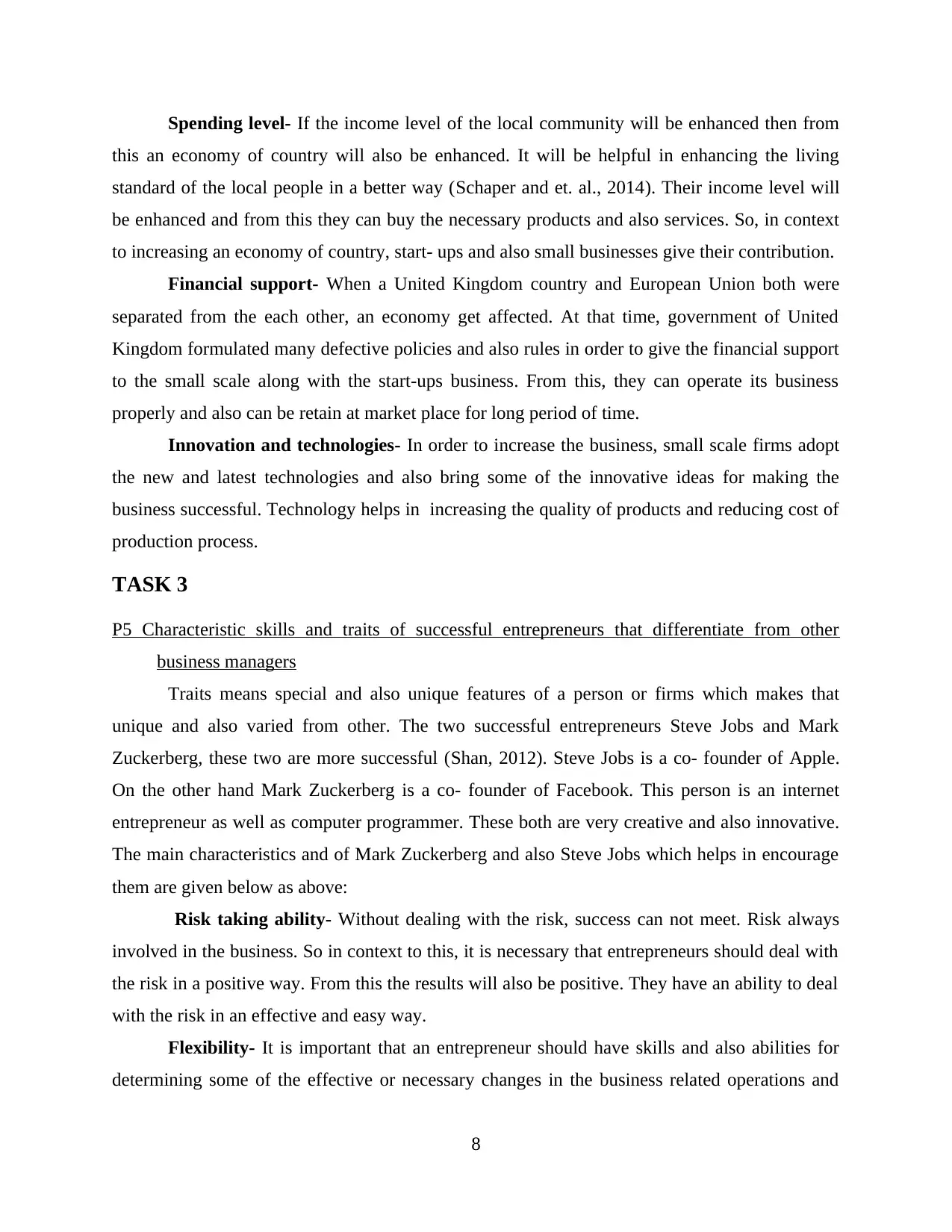
Spending level- If the income level of the local community will be enhanced then from
this an economy of country will also be enhanced. It will be helpful in enhancing the living
standard of the local people in a better way (Schaper and et. al., 2014). Their income level will
be enhanced and from this they can buy the necessary products and also services. So, in context
to increasing an economy of country, start- ups and also small businesses give their contribution.
Financial support- When a United Kingdom country and European Union both were
separated from the each other, an economy get affected. At that time, government of United
Kingdom formulated many defective policies and also rules in order to give the financial support
to the small scale along with the start-ups business. From this, they can operate its business
properly and also can be retain at market place for long period of time.
Innovation and technologies- In order to increase the business, small scale firms adopt
the new and latest technologies and also bring some of the innovative ideas for making the
business successful. Technology helps in increasing the quality of products and reducing cost of
production process.
TASK 3
P5 Characteristic skills and traits of successful entrepreneurs that differentiate from other
business managers
Traits means special and also unique features of a person or firms which makes that
unique and also varied from other. The two successful entrepreneurs Steve Jobs and Mark
Zuckerberg, these two are more successful (Shan, 2012). Steve Jobs is a co- founder of Apple.
On the other hand Mark Zuckerberg is a co- founder of Facebook. This person is an internet
entrepreneur as well as computer programmer. These both are very creative and also innovative.
The main characteristics and of Mark Zuckerberg and also Steve Jobs which helps in encourage
them are given below as above:
Risk taking ability- Without dealing with the risk, success can not meet. Risk always
involved in the business. So in context to this, it is necessary that entrepreneurs should deal with
the risk in a positive way. From this the results will also be positive. They have an ability to deal
with the risk in an effective and easy way.
Flexibility- It is important that an entrepreneur should have skills and also abilities for
determining some of the effective or necessary changes in the business related operations and
8
this an economy of country will also be enhanced. It will be helpful in enhancing the living
standard of the local people in a better way (Schaper and et. al., 2014). Their income level will
be enhanced and from this they can buy the necessary products and also services. So, in context
to increasing an economy of country, start- ups and also small businesses give their contribution.
Financial support- When a United Kingdom country and European Union both were
separated from the each other, an economy get affected. At that time, government of United
Kingdom formulated many defective policies and also rules in order to give the financial support
to the small scale along with the start-ups business. From this, they can operate its business
properly and also can be retain at market place for long period of time.
Innovation and technologies- In order to increase the business, small scale firms adopt
the new and latest technologies and also bring some of the innovative ideas for making the
business successful. Technology helps in increasing the quality of products and reducing cost of
production process.
TASK 3
P5 Characteristic skills and traits of successful entrepreneurs that differentiate from other
business managers
Traits means special and also unique features of a person or firms which makes that
unique and also varied from other. The two successful entrepreneurs Steve Jobs and Mark
Zuckerberg, these two are more successful (Shan, 2012). Steve Jobs is a co- founder of Apple.
On the other hand Mark Zuckerberg is a co- founder of Facebook. This person is an internet
entrepreneur as well as computer programmer. These both are very creative and also innovative.
The main characteristics and of Mark Zuckerberg and also Steve Jobs which helps in encourage
them are given below as above:
Risk taking ability- Without dealing with the risk, success can not meet. Risk always
involved in the business. So in context to this, it is necessary that entrepreneurs should deal with
the risk in a positive way. From this the results will also be positive. They have an ability to deal
with the risk in an effective and easy way.
Flexibility- It is important that an entrepreneur should have skills and also abilities for
determining some of the effective or necessary changes in the business related operations and
8
Secure Best Marks with AI Grader
Need help grading? Try our AI Grader for instant feedback on your assignments.
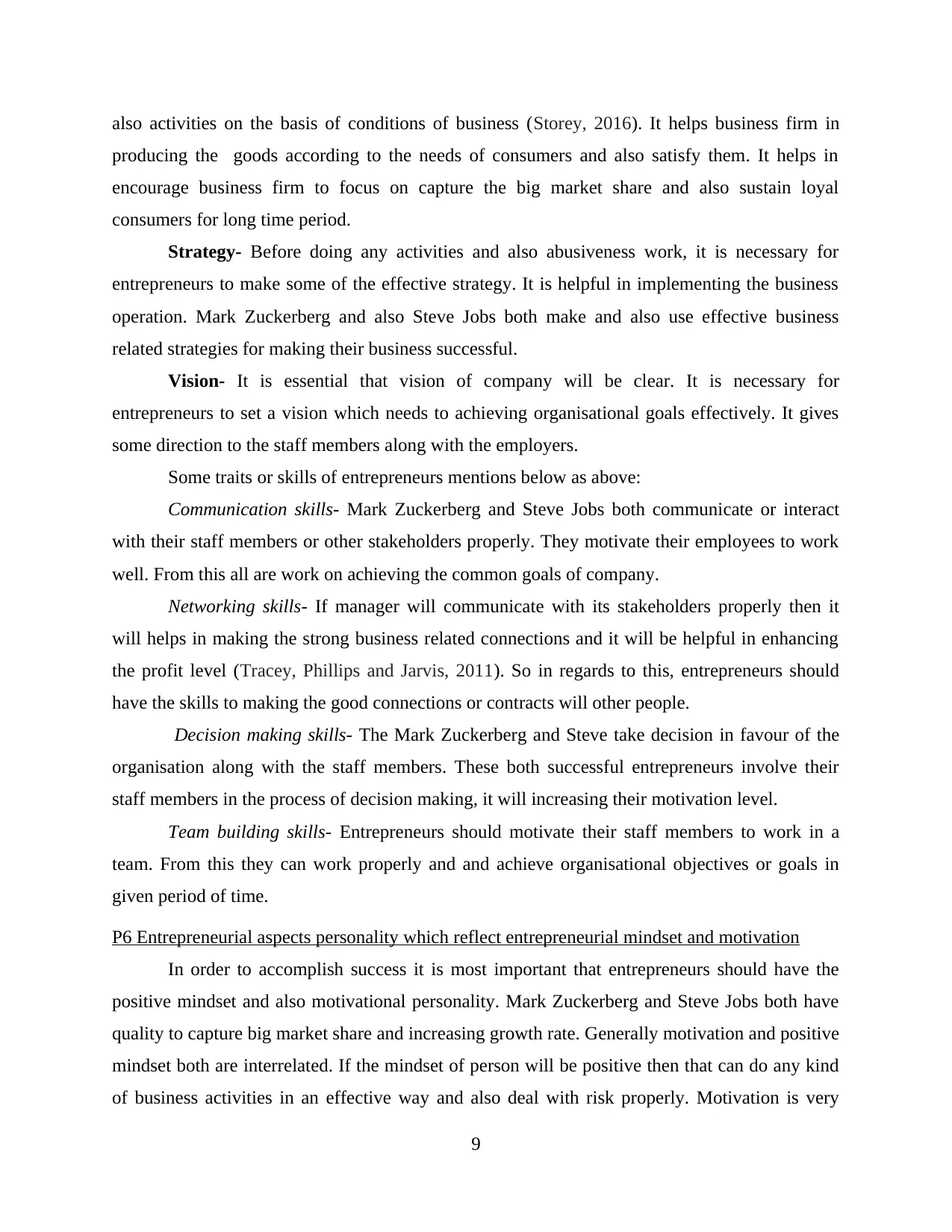
also activities on the basis of conditions of business (Storey, 2016). It helps business firm in
producing the goods according to the needs of consumers and also satisfy them. It helps in
encourage business firm to focus on capture the big market share and also sustain loyal
consumers for long time period.
Strategy- Before doing any activities and also abusiveness work, it is necessary for
entrepreneurs to make some of the effective strategy. It is helpful in implementing the business
operation. Mark Zuckerberg and also Steve Jobs both make and also use effective business
related strategies for making their business successful.
Vision- It is essential that vision of company will be clear. It is necessary for
entrepreneurs to set a vision which needs to achieving organisational goals effectively. It gives
some direction to the staff members along with the employers.
Some traits or skills of entrepreneurs mentions below as above:
Communication skills- Mark Zuckerberg and Steve Jobs both communicate or interact
with their staff members or other stakeholders properly. They motivate their employees to work
well. From this all are work on achieving the common goals of company.
Networking skills- If manager will communicate with its stakeholders properly then it
will helps in making the strong business related connections and it will be helpful in enhancing
the profit level (Tracey, Phillips and Jarvis, 2011). So in regards to this, entrepreneurs should
have the skills to making the good connections or contracts will other people.
Decision making skills- The Mark Zuckerberg and Steve take decision in favour of the
organisation along with the staff members. These both successful entrepreneurs involve their
staff members in the process of decision making, it will increasing their motivation level.
Team building skills- Entrepreneurs should motivate their staff members to work in a
team. From this they can work properly and and achieve organisational objectives or goals in
given period of time.
P6 Entrepreneurial aspects personality which reflect entrepreneurial mindset and motivation
In order to accomplish success it is most important that entrepreneurs should have the
positive mindset and also motivational personality. Mark Zuckerberg and Steve Jobs both have
quality to capture big market share and increasing growth rate. Generally motivation and positive
mindset both are interrelated. If the mindset of person will be positive then that can do any kind
of business activities in an effective way and also deal with risk properly. Motivation is very
9
producing the goods according to the needs of consumers and also satisfy them. It helps in
encourage business firm to focus on capture the big market share and also sustain loyal
consumers for long time period.
Strategy- Before doing any activities and also abusiveness work, it is necessary for
entrepreneurs to make some of the effective strategy. It is helpful in implementing the business
operation. Mark Zuckerberg and also Steve Jobs both make and also use effective business
related strategies for making their business successful.
Vision- It is essential that vision of company will be clear. It is necessary for
entrepreneurs to set a vision which needs to achieving organisational goals effectively. It gives
some direction to the staff members along with the employers.
Some traits or skills of entrepreneurs mentions below as above:
Communication skills- Mark Zuckerberg and Steve Jobs both communicate or interact
with their staff members or other stakeholders properly. They motivate their employees to work
well. From this all are work on achieving the common goals of company.
Networking skills- If manager will communicate with its stakeholders properly then it
will helps in making the strong business related connections and it will be helpful in enhancing
the profit level (Tracey, Phillips and Jarvis, 2011). So in regards to this, entrepreneurs should
have the skills to making the good connections or contracts will other people.
Decision making skills- The Mark Zuckerberg and Steve take decision in favour of the
organisation along with the staff members. These both successful entrepreneurs involve their
staff members in the process of decision making, it will increasing their motivation level.
Team building skills- Entrepreneurs should motivate their staff members to work in a
team. From this they can work properly and and achieve organisational objectives or goals in
given period of time.
P6 Entrepreneurial aspects personality which reflect entrepreneurial mindset and motivation
In order to accomplish success it is most important that entrepreneurs should have the
positive mindset and also motivational personality. Mark Zuckerberg and Steve Jobs both have
quality to capture big market share and increasing growth rate. Generally motivation and positive
mindset both are interrelated. If the mindset of person will be positive then that can do any kind
of business activities in an effective way and also deal with risk properly. Motivation is very
9
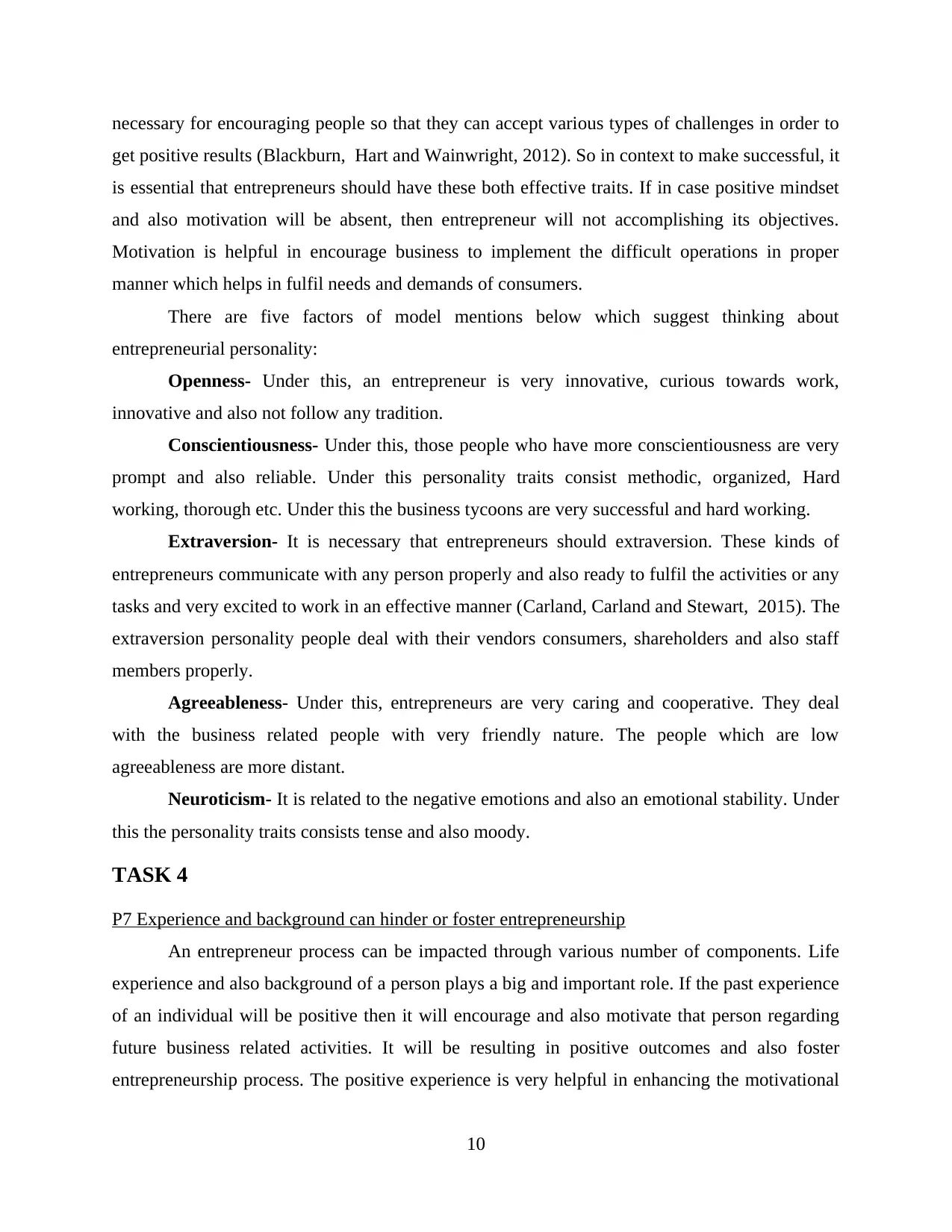
necessary for encouraging people so that they can accept various types of challenges in order to
get positive results (Blackburn, Hart and Wainwright, 2012). So in context to make successful, it
is essential that entrepreneurs should have these both effective traits. If in case positive mindset
and also motivation will be absent, then entrepreneur will not accomplishing its objectives.
Motivation is helpful in encourage business to implement the difficult operations in proper
manner which helps in fulfil needs and demands of consumers.
There are five factors of model mentions below which suggest thinking about
entrepreneurial personality:
Openness- Under this, an entrepreneur is very innovative, curious towards work,
innovative and also not follow any tradition.
Conscientiousness- Under this, those people who have more conscientiousness are very
prompt and also reliable. Under this personality traits consist methodic, organized, Hard
working, thorough etc. Under this the business tycoons are very successful and hard working.
Extraversion- It is necessary that entrepreneurs should extraversion. These kinds of
entrepreneurs communicate with any person properly and also ready to fulfil the activities or any
tasks and very excited to work in an effective manner (Carland, Carland and Stewart, 2015). The
extraversion personality people deal with their vendors consumers, shareholders and also staff
members properly.
Agreeableness- Under this, entrepreneurs are very caring and cooperative. They deal
with the business related people with very friendly nature. The people which are low
agreeableness are more distant.
Neuroticism- It is related to the negative emotions and also an emotional stability. Under
this the personality traits consists tense and also moody.
TASK 4
P7 Experience and background can hinder or foster entrepreneurship
An entrepreneur process can be impacted through various number of components. Life
experience and also background of a person plays a big and important role. If the past experience
of an individual will be positive then it will encourage and also motivate that person regarding
future business related activities. It will be resulting in positive outcomes and also foster
entrepreneurship process. The positive experience is very helpful in enhancing the motivational
10
get positive results (Blackburn, Hart and Wainwright, 2012). So in context to make successful, it
is essential that entrepreneurs should have these both effective traits. If in case positive mindset
and also motivation will be absent, then entrepreneur will not accomplishing its objectives.
Motivation is helpful in encourage business to implement the difficult operations in proper
manner which helps in fulfil needs and demands of consumers.
There are five factors of model mentions below which suggest thinking about
entrepreneurial personality:
Openness- Under this, an entrepreneur is very innovative, curious towards work,
innovative and also not follow any tradition.
Conscientiousness- Under this, those people who have more conscientiousness are very
prompt and also reliable. Under this personality traits consist methodic, organized, Hard
working, thorough etc. Under this the business tycoons are very successful and hard working.
Extraversion- It is necessary that entrepreneurs should extraversion. These kinds of
entrepreneurs communicate with any person properly and also ready to fulfil the activities or any
tasks and very excited to work in an effective manner (Carland, Carland and Stewart, 2015). The
extraversion personality people deal with their vendors consumers, shareholders and also staff
members properly.
Agreeableness- Under this, entrepreneurs are very caring and cooperative. They deal
with the business related people with very friendly nature. The people which are low
agreeableness are more distant.
Neuroticism- It is related to the negative emotions and also an emotional stability. Under
this the personality traits consists tense and also moody.
TASK 4
P7 Experience and background can hinder or foster entrepreneurship
An entrepreneur process can be impacted through various number of components. Life
experience and also background of a person plays a big and important role. If the past experience
of an individual will be positive then it will encourage and also motivate that person regarding
future business related activities. It will be resulting in positive outcomes and also foster
entrepreneurship process. The positive experience is very helpful in enhancing the motivational
10
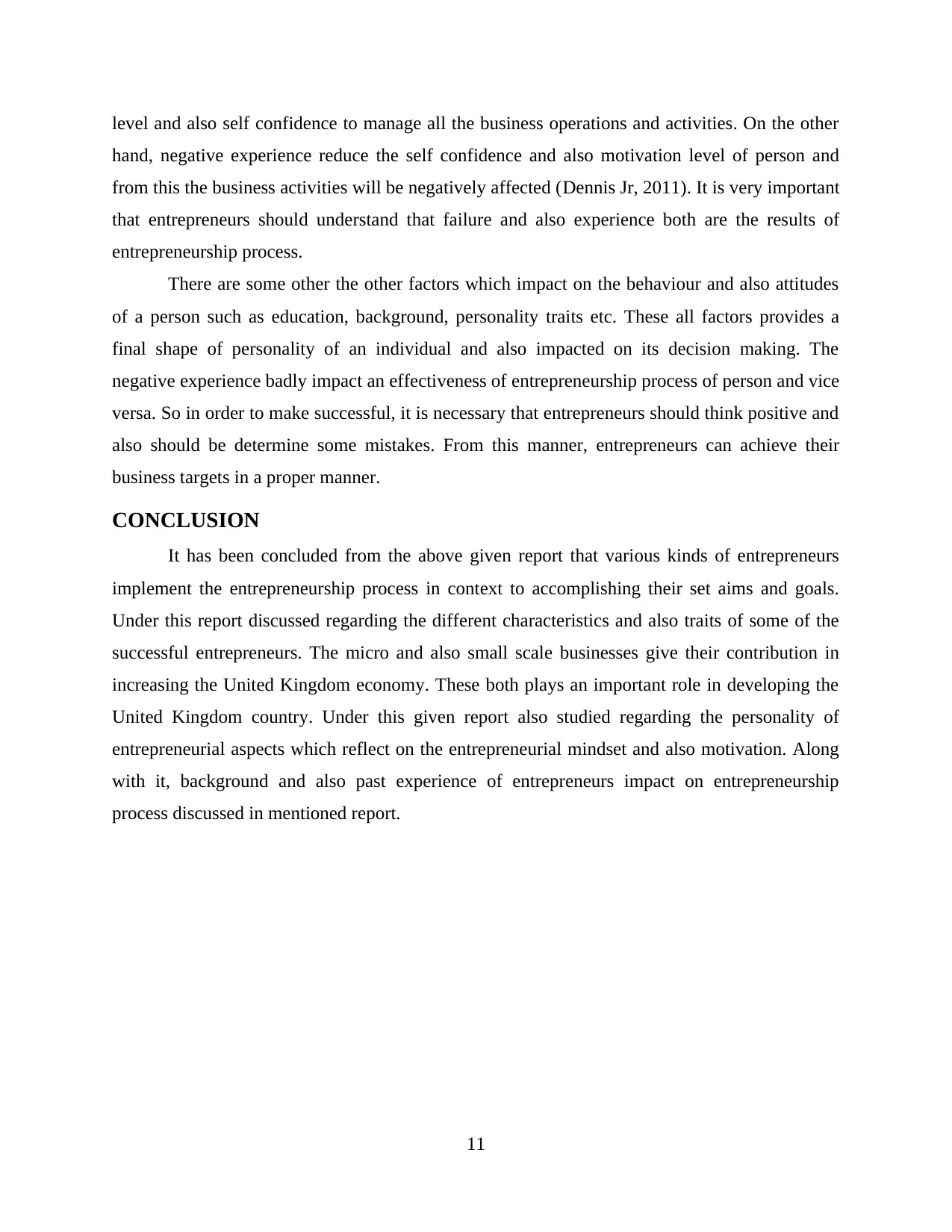
level and also self confidence to manage all the business operations and activities. On the other
hand, negative experience reduce the self confidence and also motivation level of person and
from this the business activities will be negatively affected (Dennis Jr, 2011). It is very important
that entrepreneurs should understand that failure and also experience both are the results of
entrepreneurship process.
There are some other the other factors which impact on the behaviour and also attitudes
of a person such as education, background, personality traits etc. These all factors provides a
final shape of personality of an individual and also impacted on its decision making. The
negative experience badly impact an effectiveness of entrepreneurship process of person and vice
versa. So in order to make successful, it is necessary that entrepreneurs should think positive and
also should be determine some mistakes. From this manner, entrepreneurs can achieve their
business targets in a proper manner.
CONCLUSION
It has been concluded from the above given report that various kinds of entrepreneurs
implement the entrepreneurship process in context to accomplishing their set aims and goals.
Under this report discussed regarding the different characteristics and also traits of some of the
successful entrepreneurs. The micro and also small scale businesses give their contribution in
increasing the United Kingdom economy. These both plays an important role in developing the
United Kingdom country. Under this given report also studied regarding the personality of
entrepreneurial aspects which reflect on the entrepreneurial mindset and also motivation. Along
with it, background and also past experience of entrepreneurs impact on entrepreneurship
process discussed in mentioned report.
11
hand, negative experience reduce the self confidence and also motivation level of person and
from this the business activities will be negatively affected (Dennis Jr, 2011). It is very important
that entrepreneurs should understand that failure and also experience both are the results of
entrepreneurship process.
There are some other the other factors which impact on the behaviour and also attitudes
of a person such as education, background, personality traits etc. These all factors provides a
final shape of personality of an individual and also impacted on its decision making. The
negative experience badly impact an effectiveness of entrepreneurship process of person and vice
versa. So in order to make successful, it is necessary that entrepreneurs should think positive and
also should be determine some mistakes. From this manner, entrepreneurs can achieve their
business targets in a proper manner.
CONCLUSION
It has been concluded from the above given report that various kinds of entrepreneurs
implement the entrepreneurship process in context to accomplishing their set aims and goals.
Under this report discussed regarding the different characteristics and also traits of some of the
successful entrepreneurs. The micro and also small scale businesses give their contribution in
increasing the United Kingdom economy. These both plays an important role in developing the
United Kingdom country. Under this given report also studied regarding the personality of
entrepreneurial aspects which reflect on the entrepreneurial mindset and also motivation. Along
with it, background and also past experience of entrepreneurs impact on entrepreneurship
process discussed in mentioned report.
11
Paraphrase This Document
Need a fresh take? Get an instant paraphrase of this document with our AI Paraphraser
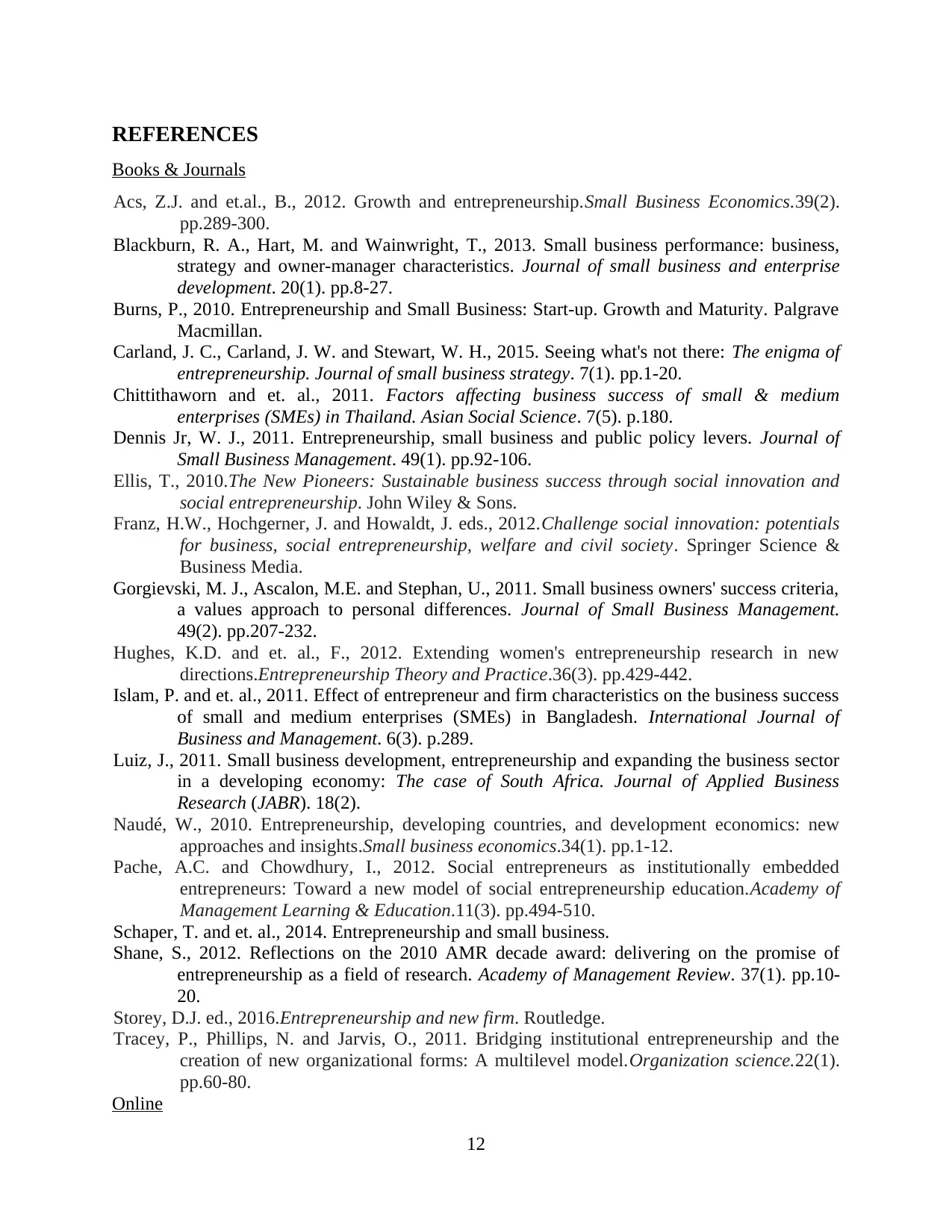
REFERENCES
Books & Journals
Acs, Z.J. and et.al., B., 2012. Growth and entrepreneurship.Small Business Economics.39(2).
pp.289-300.
Blackburn, R. A., Hart, M. and Wainwright, T., 2013. Small business performance: business,
strategy and owner-manager characteristics. Journal of small business and enterprise
development. 20(1). pp.8-27.
Burns, P., 2010. Entrepreneurship and Small Business: Start-up. Growth and Maturity. Palgrave
Macmillan.
Carland, J. C., Carland, J. W. and Stewart, W. H., 2015. Seeing what's not there: The enigma of
entrepreneurship. Journal of small business strategy. 7(1). pp.1-20.
Chittithaworn and et. al., 2011. Factors affecting business success of small & medium
enterprises (SMEs) in Thailand. Asian Social Science. 7(5). p.180.
Dennis Jr, W. J., 2011. Entrepreneurship, small business and public policy levers. Journal of
Small Business Management. 49(1). pp.92-106.
Ellis, T., 2010.The New Pioneers: Sustainable business success through social innovation and
social entrepreneurship. John Wiley & Sons.
Franz, H.W., Hochgerner, J. and Howaldt, J. eds., 2012.Challenge social innovation: potentials
for business, social entrepreneurship, welfare and civil society. Springer Science &
Business Media.
Gorgievski, M. J., Ascalon, M.E. and Stephan, U., 2011. Small business owners' success criteria,
a values approach to personal differences. Journal of Small Business Management.
49(2). pp.207-232.
Hughes, K.D. and et. al., F., 2012. Extending women's entrepreneurship research in new
directions.Entrepreneurship Theory and Practice.36(3). pp.429-442.
Islam, P. and et. al., 2011. Effect of entrepreneur and firm characteristics on the business success
of small and medium enterprises (SMEs) in Bangladesh. International Journal of
Business and Management. 6(3). p.289.
Luiz, J., 2011. Small business development, entrepreneurship and expanding the business sector
in a developing economy: The case of South Africa. Journal of Applied Business
Research (JABR). 18(2).
Naudé, W., 2010. Entrepreneurship, developing countries, and development economics: new
approaches and insights.Small business economics.34(1). pp.1-12.
Pache, A.C. and Chowdhury, I., 2012. Social entrepreneurs as institutionally embedded
entrepreneurs: Toward a new model of social entrepreneurship education.Academy of
Management Learning & Education.11(3). pp.494-510.
Schaper, T. and et. al., 2014. Entrepreneurship and small business.
Shane, S., 2012. Reflections on the 2010 AMR decade award: delivering on the promise of
entrepreneurship as a field of research. Academy of Management Review. 37(1). pp.10-
20.
Storey, D.J. ed., 2016.Entrepreneurship and new firm. Routledge.
Tracey, P., Phillips, N. and Jarvis, O., 2011. Bridging institutional entrepreneurship and the
creation of new organizational forms: A multilevel model.Organization science.22(1).
pp.60-80.
Online
12
Books & Journals
Acs, Z.J. and et.al., B., 2012. Growth and entrepreneurship.Small Business Economics.39(2).
pp.289-300.
Blackburn, R. A., Hart, M. and Wainwright, T., 2013. Small business performance: business,
strategy and owner-manager characteristics. Journal of small business and enterprise
development. 20(1). pp.8-27.
Burns, P., 2010. Entrepreneurship and Small Business: Start-up. Growth and Maturity. Palgrave
Macmillan.
Carland, J. C., Carland, J. W. and Stewart, W. H., 2015. Seeing what's not there: The enigma of
entrepreneurship. Journal of small business strategy. 7(1). pp.1-20.
Chittithaworn and et. al., 2011. Factors affecting business success of small & medium
enterprises (SMEs) in Thailand. Asian Social Science. 7(5). p.180.
Dennis Jr, W. J., 2011. Entrepreneurship, small business and public policy levers. Journal of
Small Business Management. 49(1). pp.92-106.
Ellis, T., 2010.The New Pioneers: Sustainable business success through social innovation and
social entrepreneurship. John Wiley & Sons.
Franz, H.W., Hochgerner, J. and Howaldt, J. eds., 2012.Challenge social innovation: potentials
for business, social entrepreneurship, welfare and civil society. Springer Science &
Business Media.
Gorgievski, M. J., Ascalon, M.E. and Stephan, U., 2011. Small business owners' success criteria,
a values approach to personal differences. Journal of Small Business Management.
49(2). pp.207-232.
Hughes, K.D. and et. al., F., 2012. Extending women's entrepreneurship research in new
directions.Entrepreneurship Theory and Practice.36(3). pp.429-442.
Islam, P. and et. al., 2011. Effect of entrepreneur and firm characteristics on the business success
of small and medium enterprises (SMEs) in Bangladesh. International Journal of
Business and Management. 6(3). p.289.
Luiz, J., 2011. Small business development, entrepreneurship and expanding the business sector
in a developing economy: The case of South Africa. Journal of Applied Business
Research (JABR). 18(2).
Naudé, W., 2010. Entrepreneurship, developing countries, and development economics: new
approaches and insights.Small business economics.34(1). pp.1-12.
Pache, A.C. and Chowdhury, I., 2012. Social entrepreneurs as institutionally embedded
entrepreneurs: Toward a new model of social entrepreneurship education.Academy of
Management Learning & Education.11(3). pp.494-510.
Schaper, T. and et. al., 2014. Entrepreneurship and small business.
Shane, S., 2012. Reflections on the 2010 AMR decade award: delivering on the promise of
entrepreneurship as a field of research. Academy of Management Review. 37(1). pp.10-
20.
Storey, D.J. ed., 2016.Entrepreneurship and new firm. Routledge.
Tracey, P., Phillips, N. and Jarvis, O., 2011. Bridging institutional entrepreneurship and the
creation of new organizational forms: A multilevel model.Organization science.22(1).
pp.60-80.
Online
12

The economic importance of small businesses. 2017. [Online]. Available
through:<https://www.yesgrowth.com/knowledge-centre/sme-issues/the-economic-
importance-of-small-businesses/801747318>.
13
through:<https://www.yesgrowth.com/knowledge-centre/sme-issues/the-economic-
importance-of-small-businesses/801747318>.
13
1 out of 15
Related Documents
Your All-in-One AI-Powered Toolkit for Academic Success.
+13062052269
info@desklib.com
Available 24*7 on WhatsApp / Email
![[object Object]](/_next/static/media/star-bottom.7253800d.svg)
Unlock your academic potential
© 2024 | Zucol Services PVT LTD | All rights reserved.





